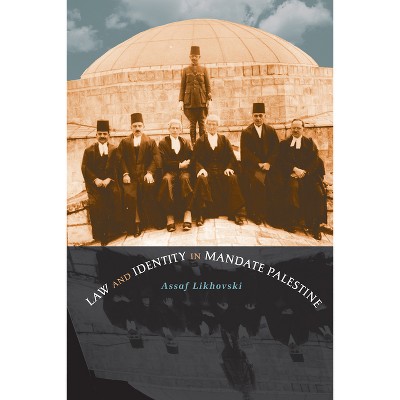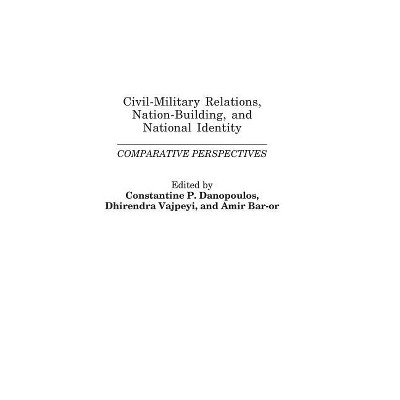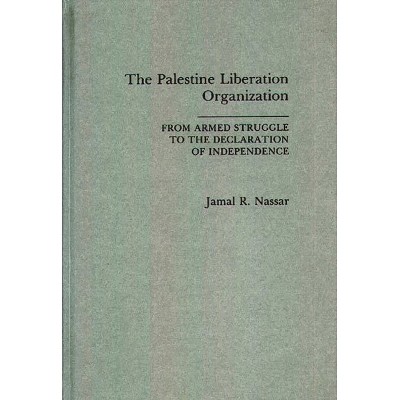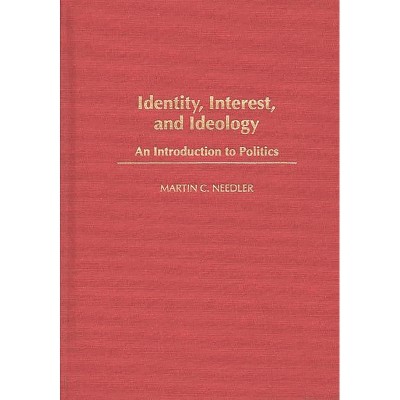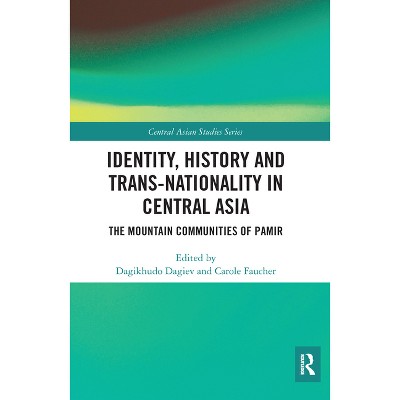Sponsored

Palestine and the Egyptian National Identity - by Ghada Hashem Talhami (Hardcover)
In Stock
Sponsored
About this item
Highlights
- In this comprehensive examination of the one of the world's most ancient societies, Talhami describes Egypt's quest for a sense of national identity and the factors that have affected the Egyptian identity.
- About the Author: GHADA HASHEM TALHAMI is Associate Professor of Politics at Lake Forest College.
- 192 Pages
- Political Science, Comparative Politics
Description
About the Book
In this comprehensive examination of the one of the world's most ancient societies, Talhami describes Egypt's quest for a sense of national identity and the factors that have affected the Egyptian identity. Generally polarized over the identity issue since the nineteenth century, Egyptians debated the significance of Sudanese bonds as a definer of Egypt's historic and national development before they debated the significance of Arab, particularly Palestinian, involvement. Nasser's rise to power, Talhami argues, amounted to an inevitable swing in the direction of pan-Arabism because of the strategic developments surrounding the rise of Israel. The author also examines Egypt's foreign policy in light of the identity question. The major conclusion of this study is that Egypt is destined to face northwards and reject isolationism because of strategic developments related to the rise of Israel. Economic and Arab leadership considerations will always impel Egypt to seek a larger role in the Arab world, but this cannot be done without sponsorship of the Palestinian issue. These conclusions challenge the accepted wisdom regarding the Camp David agreements. Those who believe that Egypt can find safety and security by linking itself with a great power while ignoring the historically-proven strategic relevance of the northeast region will find this book startling.
Although the identity debate often becomes a tool of the practicing politician, the historian, the ideologue, and the military strategist, its outcome is most likely to be determined by historical events. Egypt was bound to search for a modern sense of identity. What makes this book unique is its use of the work of literary figures, historians and politicians to investigate the cumulative impact of the changes which occurred during the Sadat period. Talhami's work places the Camp David era against the historical background of the identity debate. The fact that this debate remains unresolved today is a measure of Egypt's uncertain future as a nation and as a political community. While the majority of Egyptians recognize the inevitability of Palestinian involvement, they do not agree on the best course of action. The Persian Gulf War and Egypt's decision to side with the United States in this inter-Arab dispute constitute yet another onslaught on the Palestinians and on Arab identity. Scholars focusing on the Arab world and on Middle Eastern history and politics will find this book provocative and essential reading.
Book Synopsis
In this comprehensive examination of the one of the world's most ancient societies, Talhami describes Egypt's quest for a sense of national identity and the factors that have affected the Egyptian identity. Generally polarized over the identity issue since the nineteenth century, Egyptians debated the significance of Sudanese bonds as a definer of Egypt's historic and national development before they debated the significance of Arab, particularly Palestinian, involvement. Nasser's rise to power, Talhami argues, amounted to an inevitable swing in the direction of pan-Arabism because of the strategic developments surrounding the rise of Israel. The author also examines Egypt's foreign policy in light of the identity question. The major conclusion of this study is that Egypt is destined to face northwards and reject isolationism because of strategic developments related to the rise of Israel. Economic and Arab leadership considerations will always impel Egypt to seek a larger role in the Arab world, but this cannot be done without sponsorship of the Palestinian issue. These conclusions challenge the accepted wisdom regarding the Camp David agreements. Those who believe that Egypt can find safety and security by linking itself with a great power while ignoring the historically-proven strategic relevance of the northeast region will find this book startling.
Although the identity debate often becomes a tool of the practicing politician, the historian, the ideologue, and the military strategist, its outcome is most likely to be determined by historical events. Egypt was bound to search for a modern sense of identity. What makes this book unique is its use of the work of literary figures, historians and politicians to investigate the cumulative impact of the changes which occurred during the Sadat period. Talhami's work places the Camp David era against the historical background of the identity debate. The fact that this debate remains unresolved today is a measure of Egypt's uncertain future as a nation and as a political community. While the majority of Egyptians recognize the inevitability of Palestinian involvement, they do not agree on the best course of action. The Persian Gulf War and Egypt's decision to side with the United States in this inter-Arab dispute constitute yet another onslaught on the Palestinians and on Arab identity. Scholars focusing on the Arab world and on Middle Eastern history and politics will find this book provocative and essential reading.Review Quotes
?Talhami has written a good intellectual history of the debate in Egypt concerning Egyptian identity and the relation of that identity to the Palestine question. It is in the tradition of two earlier books, Anis Sayigh's Al-fikra al-Arabiyah fi Misr (The Arab Idea in Egypt) (Beirut, 1959) and Nadav Safran, Egypt in Search of Political Community (1961). Talhami traces the development of Egyptian ideas about, and commitment to, the Palestinians throughout the 20th century. She argues convincingly that, while political leaders have responded to Palestinian concerns based on their view of Egyptian interests, the Egyptian public and intellectuals have approached the Palestinian issue on the basis of their formulation of Egyptian identity. Thus, the advocates of Egyptian nationalism or a Mediterranean/European-oriented Egypt are less interested in, or supportive of, Palestinians than those who think of Egypt as an Arab or a Muslim country. The book is well documented and well written, is based on primary Arabic-language sources, and provides a good summary of the debates. Upper-division undergraduate and graduate students.?-Choice
"Talhami has written a good intellectual history of the debate in Egypt concerning Egyptian identity and the relation of that identity to the Palestine question. It is in the tradition of two earlier books, Anis Sayigh's Al-fikra al-Arabiyah fi Misr (The Arab Idea in Egypt) (Beirut, 1959) and Nadav Safran, Egypt in Search of Political Community (1961). Talhami traces the development of Egyptian ideas about, and commitment to, the Palestinians throughout the 20th century. She argues convincingly that, while political leaders have responded to Palestinian concerns based on their view of Egyptian interests, the Egyptian public and intellectuals have approached the Palestinian issue on the basis of their formulation of Egyptian identity. Thus, the advocates of Egyptian nationalism or a Mediterranean/European-oriented Egypt are less interested in, or supportive of, Palestinians than those who think of Egypt as an Arab or a Muslim country. The book is well documented and well written, is based on primary Arabic-language sources, and provides a good summary of the debates. Upper-division undergraduate and graduate students."-Choice
About the Author
GHADA HASHEM TALHAMI is Associate Professor of Politics at Lake Forest College. She was born in Jerusalem and was educated in England, Jordan, and the United States. She is the author of Suakin and Massawa under Egyptian Rule, 1865-1881 (1979), as well as numerous articles on Palestinian nationalism, Islamic fundamentalism, women in revolutionary movements, Islam in Africa, and Palestinian human rights. Dr. Talhami is a fellow of the Middle East Studies Center at the University of Chicago.Shipping details
Return details
Trending Non-Fiction






